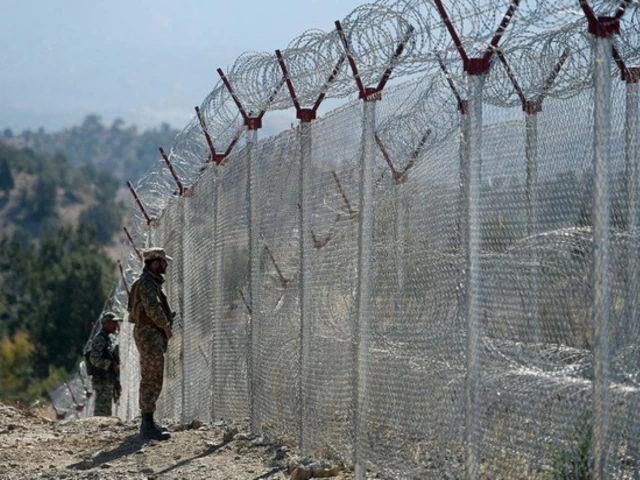“They now understand that Pakistan will pursue the TTP or any other group wherever it finds them, even in Kabul”
Pakistani soldiers stand vigil next to the new border fence along the border of Afghanistan’s Paktika province in Angoor Adda, South Waziristan. Photo: AFP)
ISLAMABAD:
Pakistan’s retaliatory strikes in Kabul last month, targeting senior commanders of the banned group Tehreek-e-Taliban Pakistan (TTP), have created a “new deterrent”, triggering unease in the ranks of the Afghan Taliban and contributing to a notable decline in terrorist attacks inside Pakistan, official sources told The Express PK Press Club.
The cross-border operation, carried out in the heart of Kabul, aimed to send what officials described as an “unequivocal message” to the Taliban regime that Pakistan would no longer confine its counterterrorism responses to its own soil.
The strike, widely interpreted as Pakistan’s most assertive move since the Taliban takeover of Afghanistan in 2021, targeted hideouts and facilitators responsible for orchestrating recent attacks inside Pakistan.
According to officials familiar with the matter, the Kabul operation had a “psychological impact” on the leadership and security apparatus of the Afghan Taliban.
“Since the Kabul strikes, there has been a clear element of fear and caution within the Taliban ranks,” one official said. “They now understand that Pakistan will pursue the TTP or any other group wherever it finds them, even in Kabul.”
The official said that immediately after the recent terrorist attack in Islamabad, Afghan Taliban interlocutors privately contacted Pakistani authorities asking them to de-escalate and indicated they had “no involvement” in the suicide attack outside the court complex.
“It was a very unusual decision,” the official noted. “In previous incidents, they either dismissed Pakistan’s concerns or blamed TTP factions. This time, they pleaded behind the scenes, insisting they were not behind the attack.”
The reason was that the Taliban regime feared reprisals from Pakistan. Kabul now understands that Islamabad has the reach and capability to hit targets deep inside Afghanistan.
Authorities observed a drop in the number of terrorist attacks following the Kabul strikes, officials said. While emphasizing that the threat has not disappeared, this reduction is seen as a direct consequence of the deterrence established by Pakistan’s desire to strike high-value targets inside Afghanistan.
“After Kabul, they know the price,” one official said. “For the first time in years, Pakistan’s message has been loud and clear: if you allow your soil to be used against us, there will be consequences and those consequences could ripple inside Afghanistan.”
Officials also believe the strikes disrupted some TTP networks and forced the group into a defensive posture, limiting its ability to coordinate subsequent attacks.
Sources pointed out that Pakistan’s policy is now unambiguous; any future attack from Afghan soil will receive a “rapid and decisive” response.
“Pakistan will not wait for prolonged diplomatic exchanges,” said an official. “Our red line is simple. If there is another attack, we will act immediately.”
Officials also dismissed concerns about possible international backlash, arguing that the global environment is more accommodating than in previous years. Many senior leaders of the Afghan Taliban remain on U.N. sanctions lists, and Western capitals are increasingly frustrated by Kabul’s reluctance to crack down on terrorist groups operating within its borders.
“Pakistan does not expect significant diplomatic costs,” one official said. “The world has not forgotten who the Taliban leaders are. Countries may want stability in Afghanistan, but no one is willing to defend the TTP or excuse the Taliban’s inaction.”
Islamabad hopes these new pressures will force the Afghan Taliban to reevaluate their long-standing ties to the TTP. For now, Pakistani officials say they will continue to monitor the security situation and respond “when and where” necessary.
“The Kabul strikes are not an isolated episode,” said a senior source. “It was the signal of a new doctrine. If the Taliban does not act, Pakistan will act.”




